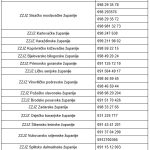
July the 9th, 2020 – Representatives of Croatian creative industries claim that it’s an illusion to think that the current climate is something that will pass, and that instead we need to realise that this is our new reality. On top of that, as Novac writes, they stated that classic banks don’t understand what such industries do, and the interest rates they offer are entirely unrealistic.
“So far, we’ve been more concerned with emphasising the importance of culture and creativity, but now we’re all in a war. Our activities are intertwined, so even now our entire ecosystem is disrupted. The crisis has shown how much we all depend on each other, for example, the impact of closing restaurants on musicians’ earnings,” said the president of the HGK Association of Cultural and Creative Industries, Tomo in der Mühlen, at a recent extended session of the HGK’s Community of Cultural and Creative Industries Council.
He noted that, as stated, banks tend not to understand Croatian creative industries well at all.
“There’s better support abroad in that sense, and we can see that the owners of festival licenses are foreigners and that they’re coming to be a competition on our market. We’re going to make the rules of the game the same for everyone,” said in der Mühlen.
“We’ve created two sets of measures, the first as direct assistance to the affected sectors during the suspension of cultural events. The second is the exit strategy, ie, an adaptation to the current situation. We’ll have to live with this for a while,” said Kresimir Partl, State Secretary at the Ministry of Culture.
He pointed out cinema screens not only in Croatia but in the entire EU are among the hardest hit of all.
“It will take a long time for this industry to recover,” Partl said.
He also presented concrete measures from the Ministry of Culture for Croatian creative industries, such as additional funds for audiovisual activities financed from HAVC for the needs of additional production costs due to the enforced epidemiological measures. In cooperation with HAMAG-BICRO and the Ministry of Finance, credit lines for cultural enterprises based on the Temporary Framework of the European Commission have also been provided. A total of 300 million kuna in credit lines is envisaged, for which the Government provides a 100% guarantee with an interest rate of up to 2%.
“The long-term goal is to connect these industries with other segments of the economy, such as manufacturing, in order to create products competitive on the global market because we can’t go for economies of scale, but added value,” said HGK’s Tomislav Rados.
Jagoda Divic, Business Secretary of the Association and Assistant Director of the Industry Sector of the Croatian Chamber of Commerce, presented the upcoming activities of the Association.
“The goal is to establish [these] industries as a competitive and independent economic area, systematically monitor indicators, attract external capital, establish a platform for funding models, especially for beginners, and continue to work on copyright protection and dialogue with institutions, other professions and the scientific community,” said Divic.
Nenad Marcec from ZAMP pointed out that the concept under which events can be organised was accepted by the Croatian Government, but that events still aren’t taking place. Organisers simply don’t dare to invest. However, there is also an increase in online revenue as well as an increase in creativity.
“People used this time to be productive,” Marcec said. Attendees also agreed that the problem was that the public thought that nightclubs were the main culprits of the spread of infection, or at least one of them.
“When recommendations were made, in order to enable cultural events to take place, the maximum number of people was determined, and the possibility to consult the Ministry of Culture for a larger number of visitors under specific conditions was also enabled,” said Partl, calling on everyone to contact the Ministry.
Robert Zuber, the director of the Rab Film Festival, commented on the inconsistency of the instructions, due to the rapid change, but also the different levels of implementation at the local level. “I refuse to give up and I refuse to be guilty if we did everything right,” said Zuber, noting that funds are limited and that we need to think about how to create a model through which we can continue to make money.
Berislav Marszalek also confirmed that the problem for everyone is uncertainty. “In Belgium, they created an application where the organiser reports the event to the system, he is assigned with a ‘risk colour’ and that’s something he can then communicate to the audience. We also need a risk assessment model and a central place through which we can inform and communicate about events,” said Marszalek.
Petar Pavic, vice-president of the Marketing Association of the Croatian Chamber of Commerce, agreed about the platform, which would then be broadcast by the media, thus reducing the stigma for the event organisers.
Boris Kovacek from the Weekend Media Festival also commented on some old ills of the industry and pointed out the complicated procedure of bringing in foreign lecturers. “It would also be good to exclude festivals from the fiscalisation system if you only pay with cards,” Kovacek said.
The president of the Association for Industrial Design of the Croatian Chamber of Commerce, Silvija Jonjic, agreed that there were problems even before the coronavirus pandemic struck Croatia, such as a shortage of products because the industrial designer doesn’t always cooperate with the manufacturer, who stated that a real and high quality strategy is now desperately needed.
For more on Croatian creative industries and the coronavirus age, follow our lifestyle section.










